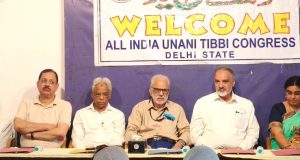Muted Ceremony at India-Pakistan Border as Tensions Rise
On April 25, 2025, Indian Border Security Force troops (in brown) and Pakistani Rangers (in black) performed the traditional beating retreat ceremony at the Wagah border, 35 km from Amritsar.
With soldiers performing high kicks to the sound of booming patriotic music and crowds cheering loudly, the ceremony between the nuclear-armed neighbors unfolded with its usual spectacle.
But one symbolic moment was missing: the customary handshake between the soldiers never happened.
Tensions between India and Pakistan have escalated sharply after New Delhi accused Islamabad of being behind a deadly April 22 attack on tourists — the deadliest assault on civilians in Indian-administered Kashmir in years.
Pakistan has denied the accusations, but both sides have since exchanged gunfire, expelled diplomats and citizens, and ordered the border closed.
The iron gates separating the two countries remain firmly locked.
“It fills you with passion and pride,” said Simarjeet Singh, 17, from Amritsar, his face painted with India’s tricolor flag.
However, concerns about a potential military escalation are mounting.
‘Loyal Crowds’
The Attari-Wagah border ceremony has long been a major tourist attraction, drawing visitors eager to witness the dramatic goose-stepping and pageantry.
Although attendance was lower than usual on Saturday, thousands of Indians still turned up to show their patriotism.
“There were people from all over, looking and dressing differently, but all cheering and shouting together — for our country and our soldiers,” said Singh, who attended with college friends.
Around 5,000 Indians — about a fifth of the border arena’s capacity — filled the stands, compared to a far smaller crowd on the Pakistani side.
Waving flags and chanting “India Zindabad” (“Long live India”), the Indian side kept the energy alive.
The Wagah border ceremony has endured for decades despite countless clashes and diplomatic crises since 1947, when the British partitioned India and Pakistan along religious lines.
Among the visitors were Reena Devi, 54, and PK Nath, 70, from Tezpur in India’s northeast.
“We’re thrilled to be here,” said Devi. “We wanted to witness this ceremony and experience standing at the border.”
Nath said their group planned to visit religious sites in Jammu and Kashmir but admitted some travelers were nervous about security.
Nath also expressed full support for New Delhi’s move to expel Pakistani citizens and close the border.
“You can’t attack people here and expect no consequences,” he said. “We don’t know what lies ahead, but we trust the government will make the right call.”
As Indian soldiers in red-fanned hats and their Pakistani counterparts performed their powerful routines, the locked gates between them stood as a stark reminder of the simmering conflict.
‘Anxious but Defiant’
Beyond the spectacle, tensions have disrupted daily life: citizens are rushing to cross the border before visas expire on April 29, separating families with ties in both countries.
“There’s definitely a sense of anxiety right now,” said Harpal Singh, a taxi driver from Amritsar who often ferries visitors to the ceremony, insisting it’s still an experience worth having.
“Everyone who visits leaves energized and amazed,” he said.
KT Ramesh, 57, from Kerala, agreed the event was worth attending despite its scaled-down nature.
“Our people’s spirit was as strong as ever,” Ramesh said.
He added that anger over the Kashmir attack was palpable.
“Everyone I spoke to — hotel staff, taxi drivers, tourists — talked about it,” he said. “We don’t want war, but this time people believe a firm response is needed.
 Times Of Pedia Times of Pedia TOP News | Breaking news | Hot News | | Latest News | Current Affairs
Times Of Pedia Times of Pedia TOP News | Breaking news | Hot News | | Latest News | Current Affairs






